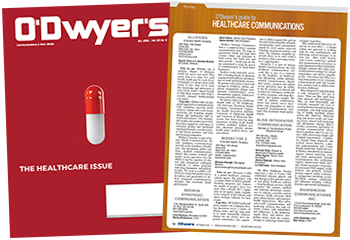 Maura Bergen |
According to the 2018 Cone/Porter Novelli Purpose Study, 87 percent of Americans feel the health and wellness industry must have a sense of purpose. Not surprising for an industry that has such a personal impact on so many.
Had we conducted this same survey a few years ago, the results may have been different. However, consumer attitudes and behaviors are changing, and so too are their expectations.
They expect companies to take a stance on social issues.
They expect companies to have and lead with purpose.
They expect companies to anticipate and address their needs, today and tomorrow.
No small feat, yet this sense of urgency from consumers has still not translated into action for some health brands. How can we be the partner our clients need to rise to the challenge and meet these growing demands? The answer lies beyond traditional PR tactics.
Today’s health environment is full of complexities, and so is the world. We must push our clients to step outside their comfort zone and stand up for the right issues. It’s common knowledge that pharmaceutical companies are center stage when it comes to equitable access to affordability of potentially life-saving medicines, medical devices, technologies and vaccines.
However, in the undeniably tumultuous times we’re living in — fraught with an unprecedented level of political and environmental uncertainties and social justice challenges — no issue is off-limits. Even an issue that transcends a company’s immediate operational footprint.
The 2018 Cone/Porter Novelli Purpose Study found that 71 percent of American consumers expect companies to connect with them emotionally on issues that matter to them personally, whether it’s access to healthcare, racial equality, sexual harassment or gun control.
For the highly-regulated health industry, it’s become increasingly difficult to sit on the sidelines. Taking a stand on issues of consumer interest is paramount to creating and sustaining brand equity and trust.
To help our clients do this, we must compel them to act and support them in tackling issues head-on through bold and authentic campaigns that are empathetic and — perhaps most importantly — supported by business actions.
With choice and control more often in the hands of consumers, we must help our clients define and demonstrate why their brands matter. While the consumerization of health has been driven in part by Millennials, the socially conscious consumer is quickly becoming the norm.
Nearly nine in 10 (88 percent) American consumers say they would buy a product from a company leading with purpose. Purpose-driven brands also engender a deep loyalty which means brand advocates will not only try new items (75 percent) but pay more (57 percent) just to lend support to their favorite companies.
What’s important to note is that purpose is more than just a mission statement or a commitment of values. It’s what defines an organization’s authentic role and value in society and allows it to simultaneously grow its business and positively impact the world. To be successful, it must be -deeply embedded within the organization, the brand and the experience that’s delivered.
We are helping our clients to do just this by assessing their brand’s unique role in society, defining and articulating their purpose and ensuring that it’s both activated externally and embedded internally within the company’s operations and business practices. CVS took a stand back in September 2014, becoming the first national retail pharmacy chain to stop selling tobacco products in all owned stores because it conflicted with the organization’s purpose of helping people on their path to better health. Since then, CVS has continued helping people lead tobacco-free live by investing in and working with leading anti-tobacco and youth organizations to support education, advocacy and healthy behavior initiatives to move the nation towards a tobacco-free generation.
The benefits of having and leading with purpose go beyond consumer loyalty and revenue. It also makes companies more attractive to prospective talent, with more than two-thirds (68 percent) of Americans saying they would work for purpose-driven companies.
Social media and technology are enabling open, direct and two-way communication with consumers. Now more than ever, we must ensure our clients are connecting with their audiences through the right media at the right time to be heard. The health industry has big shoes to fill. With businesses like retail and beauty charting the course, consumers have grown accustomed to personalization and immediacy, getting what they want, and when and where they want it.
For an industry that has only in the last decade or so come around to the idea that a “one-size-fits-all” model is unsustainable, this way of thinking has required a complete shift in mindset. Digital advancements have afforded us the ability to take personalized care to new heights and create connected experiences that integrate seamlessly into consumers’ everyday lives.
As communicators, we need to bring this same forward-thinking approach to message development and dissemination that many health companies are applying to the innovative products and solutions they design.
Helping our clients to define and articulate their purpose is only half the battle. To drive behavior change, it must be communicated through platforms that reach and resonate with key stakeholders. These vehicles will continue to change with advancing technology and shifting consumer interests, requiring Porter Novelli to stay nimble and tuned in to respond to their evolving needs today and tomorrow.
Expectations are growing, yes, but so are our opportunities to drive purposeful action. We have a responsibility to our clients — and to the customers and consumers they serve — to keep purpose and people at the center of our work.
***
Maura Bergen is an executive vice president and the U.S. Health Lead for Porter Novelli.



 Lo Isidro, senior director at Real Chemistry with more than a decade of strategic communications and PA experience, has joined Narrative Strategies.
Lo Isidro, senior director at Real Chemistry with more than a decade of strategic communications and PA experience, has joined Narrative Strategies. Nelson Fernandez, former North American chair of APCO Worldwide and managing director of Burson-Marsteller, has joined Volunteers in Medicine Berkshires as director of communications and PA.
Nelson Fernandez, former North American chair of APCO Worldwide and managing director of Burson-Marsteller, has joined Volunteers in Medicine Berkshires as director of communications and PA. Lilit Bargar, who was most recently an EVP in the healthcare practice at Weber Shandwick, comes on board at GCI Health as EVP, corporate practice lead.
Lilit Bargar, who was most recently an EVP in the healthcare practice at Weber Shandwick, comes on board at GCI Health as EVP, corporate practice lead.
 Five ways that successful thought leaders are made.
Five ways that successful thought leaders are made.


 Have a comment? Send it to
Have a comment? Send it to 
No comments have been submitted for this story yet.